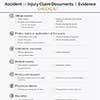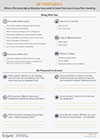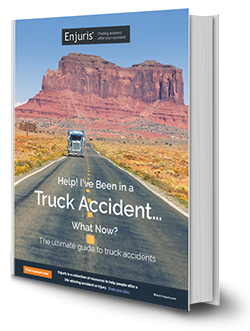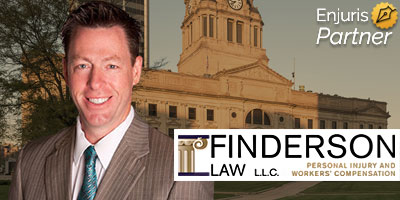Find out what you need to do to recover damages following a truck accident in the Hoosier State
Picture this:
A commercial truck weighing 80,000 pounds and standing 14 feet tall parked next to a 3,000 pound Ford Focus...standing 5 feet tall.
It goes without saying that commercial truck and passenger car collisions are often catastrophic.
If you've been injured in a truck accident in Indiana, you might be facing a long road to recovery. Here at Enjuris, we hope to provide you with the information you need to make it a smooth road — starting with some important and shocking statistics.
Truck accident statistics
Indiana is the 5th busiest state for commercial freight traffic. Every year, 724 million tons of freight travel through the Hoosier State. All of this traffic means truck accidents are inevitable.
The Indiana Criminal Justice Institute (ICJI) works with the National Highway Traffic Safety Administration (NHTSA) to analyze crash data in Indiana. The ICJI found that roughly 5% of all motor vehicle accidents in Indiana involved large trucks. This means there were almost 11,000 accidents involving large trucks in 2018.
Nationally, large truck accident statistics are just as alarming. The number of people injured in truck crashes every year across the country has almost doubled since 2009, from 74,000 to 145,000 people.
Common causes of truck accidents
The ICJI found that driver-related actions account for 94% of collisions involving commercial trucks. The primary factors include:
- Unsafe lane movement
- Improper passing and turning
- Following too closely
- Unsafe backing
- Failing to yield
- Speeding
Drivers of commercial trucks were more likely to cause an accident by backing up unsafely, whereas drivers of passenger vehicles were more likely to cause an accident by passing improperly.
The FMCSA conducted a national investigation of the actions that lead to truck accidents and found that they could generally be broken down as follows:
- Decision (38%)—The driver was driving too fast for conditions, misjudged the speed of other vehicles, or followed other vehicles too closely.
- Recognition (28%)—The driver was inattentive, distracted by something inside or outside the vehicle, or failed to observe the situation adequately for some other reason.
- Non-performance (12%)—The driver fell asleep or was physically impaired for some reason.
- Vehicle (10%)—Vehicle failures, such as brake failure.
- Performance (9%)—The driver panicked, overcompensated, or exercised poor directional control.
- Environment (3%)—Poor weather conditions, such as fog or heavy rain.
Indiana laws governing truck accidents
Federal laws govern the commercial trucking industry throughout the United States. These laws establish certain standards that trucking companies and drivers must meet. The vast majority of federal regulations can be found in Title 49 of the Code of Federal Regulations and cover things like:
- Maximum vehicle weight
- Transportation of hazardous materials
- Drug and alcohol testing
- Licensing requirements
- Inspections
- Emergency signal equipment
- Use of hand-held devices (they're strictly prohibited)
The Indiana Department of Transportation has its own set of trucking regulations that provide additional requirements concerning things like obtaining oversized load permits.
Who's at fault for a truck accident?
When it comes to truck accidents, there are a number of parties who may be at fault for the accident, including:
- The truck driver
- The owner of the truck
- The company that leased the truck from the owner
- The manufacturer of the truck or truck components
- The person who loaded the ship's cargo
To prove fault, the plaintiff generally needs to establish that the defendant was negligent—in other words, that the defendant failed to exercise reasonable care, and this failure caused the accident.
It’s common for a defendant to point their finger at someone else. For example, the truck company might claim that the tire manufacturer was responsible for the accident because the tires were defective. In turn, the tire manufacturer might argue that the truck company is responsible because they failed to keep the tires properly inflated. Because it’s common for a defendant to point their finger at someone else, lawyers typically sue every party that might be responsible and let them argue among themselves.
In Indiana, the legal theory of "respondeat superior" can be used to hold a truck company responsible for an accident caused by its employee. Under this theory, the truck company is liable for the actions of its employee so long as the actions were:
- Unintentional, and
- Committed within the scope of the employee's employment and in furtherance of the employer's business.
Indiana's shared liability laws
In some cases, the plaintiff and the defendant are partially responsible for a truck accident.
What happens then?
Indiana has adopted the modified comparative fault rule. This rule means that the plaintiff's damages are reduced by their percentage of fault. What's more, if the plaintiff is considered more than 50% at fault for the accident, the plaintiff is barred from recovering ANY damages.
Let's look at an example:
Ben is driving an 18-wheeler south on I-70 in Reelsville, Indiana. He blows a tire and pulls to the side of the road. He gets out to repair the tire but fails to put up the warning cones required by law.
Tyler is also driving south on I-70 in Reelsville. He's driving in the right lane and texting his friend. Because he's looking down at his phone, he doesn't see the truck pulled to the side of the road. His car clips the side of the truck causing him to crash.
Tyler sustains injuries in the accident and sues Ben for $100,000, claiming that Ben's failure to put up warning cones was the cause of the accident. The court finds that Ben was 30% at fault, but that Tyler was 70% at fault for texting while driving.
Because Tyler is more than 50% at fault, he's prohibited from recovering ANY damages. If, on the other hand, Tyler was found 30% at fault, his damages would simply be reduced to 70% and he would recover $70,000.
How long do I have to file a truck accident lawsuit in Indiana?
However, if you plan to sue the government (for example, if an Indiana Public Works Department truck caused the accident), you must provide a tort claim notice to the appropriate government agency within 180 days.
Learn more about Indiana's statute of limitations.
What to do after a truck accident (4 steps)
If you're involved in a truck accident in Indiana, there are 4 important steps to take:
Step 1: Stop and provide assistance
Following an accident, Indiana drivers are required by law to:
- Stop their vehicle at the scene or as close to the scene as possible,
- Provide their name, address, registration number, and driver's license to others involved in the accident, and
- Assist any injured persons.
Step 2: Gather evidence
Once you're safe, gather as much evidence as you can. Here are some things to gather:
- Photographs of the crash scene and any damages
- Contact information for any witnesses
- Contact information for any drivers or passengers involved in the crash
Step 3: Visit your doctor
Even if you don't think you're seriously hurt, it's important to visit your doctor after a truck accident. Some injuries, including serious internal injuries, don't show symptoms until hours or even days after an accident.
Step 4: Consult an attorney
More often than not, truck accidents involve serious injuries or death, which means it's typically in the best interest of truck accident victims to talk to a knowledgeable personal injury lawyer.
Fortunately, most initial consultations are free. During an initial consultation, an attorney can evaluate your case and provide you with options.
To get the most out of your initial consultation, bring all the relevant documents you have. You should also be prepared to answer the questions the attorney is most likely going to ask.
 Documents & Evidence Checklist
Documents & Evidence Checklist
Checklist of 30 items to help you prepare for making a personal injury or accident claim
Download in PDF format![]()
 Your First Meeting with an Attorney
Your First Meeting with an Attorney
A worksheet to prepare for your first meeting with a personal injury attorney – what to bring, what they'll ask
Download in PDF format![]()
Should you talk to an insurance adjuster?
If you're involved in a truck accident, there's a good chance the claims adjuster (the person tasked with investigating insurance claims) for the truck driver's insurance company will contact you after the accident. The first thing you should know is that you are NOT legally required to talk to the claims adjuster for the other driver's insurance company.
In fact, it's usually a bad idea to talk to the other driver's claims adjuster if you plan on making a claim for physical injuries. With that warning in mind, there are a few things to remember if you do decide to talk to the claims adjuster for whatever reason:
- Be calm and polite. Though it might be challenging given the stress of the accident, it's in your best interest to remain calm and polite throughout the telephone call. You don't want to give the claims adjuster extra incentive to slow or deny your claim.
- Stick to the basics when discussing the accident. The claims adjuster will want you to give a statement about the accident. Stick to the basics: when it happened, where it happened, what vehicles were involved. Do NOT discuss the cause of the accident or any other details about the accident. If the claims adjuster continues to push you for more information, simply tell the adjuster that: "the accident investigation is ongoing and I'll discuss the facts with you in the future when it's appropriate to do so."
- Don't provide too much information about anything else. The job of the claims adjuster is to uncover facts that could limit your recovery. For this reason, avoid going into detail about the injuries you sustained, your medical history, your work history, or anything else that might be used against you.
- Don't accept an initial settlement offer. If the claims adjuster makes an offer, tell the adjuster that you'll need to think about it. Initial offers are generally low and you should talk to an attorney before accepting one.
In most cases, you're legally obligated to talk to YOUR insurance company after an accident.
Did you know that truck accident law varies by state?
A personal injury lawyer helps individuals who have sustained injuries in accidents to recover financial compensation. These funds are often needed to pay for medical treatment, make up for lost wages and provide compensation for injuries suffered. Sometimes a case that seems simple at first may become more complicated. In these cases, consider hiring an experienced personal injury lawyer. Read moreNeed a lawyer?
What does an injury lawyer do?















